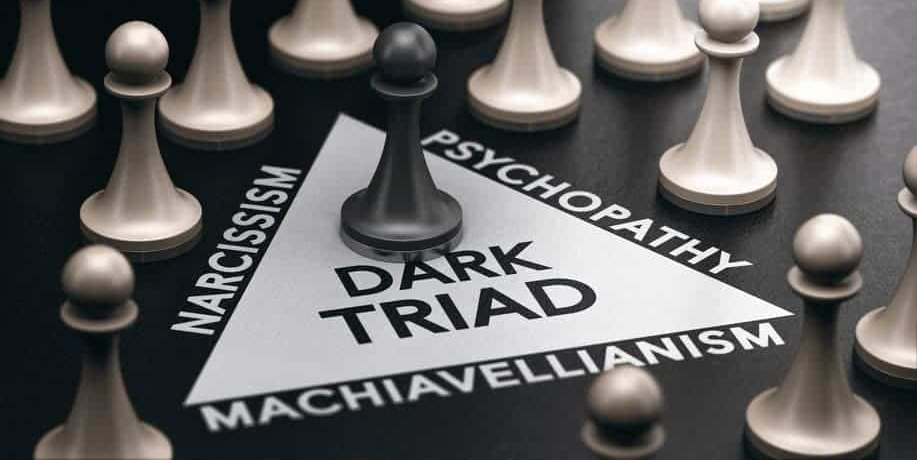OXFORD REVIEW RESEARCH BRIEFING
Coach Dark Triad Traits may be a neglected area of attention. What happens when the coach has dark triad traits? In a new study, Professor Adrian Furnham, of University College London has explored the area of coach dark triad traits and what impact they might have on coachees.
Executive Coaching
Executive coaching is a popular way for senior executives to improve their professional skills and help to achieve developmental goals. This process requires what is known as the working alliance, in which the coach and executives form a positive, cooperative and constructive working relationship.
It is usually assumed that the coach’s personality traits will be conducive to developing a good working alliance. But what if this isn’t the case? What if the coach displays the dark triad personality traits?’

The dark triad
The dark triad is a trio of the negative personality traits of:
- Psychopathy
- Machiavellianism
- Narcissism
Psychopathy
Psychopathy is an antisocial disorder that is marked by a lack of normal emotional response and empathy, coupled with low impulse control. Psychopaths find it difficult to develop normal functioning relationships and display high levels of egocentrism. Psychopathy frequently leads to the individual’s manipulating others for their own purposes, with no sense of guilt or empathy, and can be highly damaging to their victims.
There are two forms of psychopathy:
- Primary psychopathy, which is defined by low agreeableness or reduced social cooperation with others.
- Secondary psychopathy, which is characterised by low agreeableness and high levels of neuroticism expressed as anxiety and emotional instability.
Machiavellianism
Machiavellianism is defined by cunning and the manipulation of others’ distrust of others and the manipulation to achieve goals, gain power and reach higher social status. People with higher levels of Machiavellianism tend to control others through both direct and indirect means.
Narcissism
Narcissism is the pursuit of self-gratification through vanity or egotistic admiration of one’s idealised self-image and is expressed as a need for more authority and an over-inflated view of oneself.
- Narcissistic coaches may rate their skills and abilities like effectiveness highly, even when this is not the case and clients are unhappy.
- Coaches may also see themselves as skilful and accomplished when they are actually mediocre, so career satisfaction may seem higher.
Previous research
Previous research looking at the importance of establishing a positive coaching relationship (working alliance) with clients and the impact of the coach’s personality traits on this professional exchange have found that:
- The quality of relationship between coaches and their clients is the second most crucial factor that impacts coaching effectiveness.
- Emotional intelligence is positively connected to pro-social behaviours and it reduces antisocial deviant behaviour.
- Narcissistic people have an over-inflated sense of self and their job performance or work quality.

A new study
A new study by researchers from University College London in the UK and the Norwegian Business School in Norway has looked at the effects of dark triad personality traits on executive coaches’ effectiveness with clients and their career satisfaction and what impact emotional intelligence and self-monitoring has on these.
Findings
The study found that:
- Primary and secondary psychopathy, and Machiavellianism combined, have a significantly negative impact on both the coaches’ career satisfaction and their effectiveness as a coach.
- Unexpectedly, it was found that there appears to be a positive connection between narcissism and coaching effectiveness. It was, however, found that narcissistic executive coaches tend to express high opinions of their coaching skills when they self-report data. Whether clients would agree with their self-assessment or not is another issue and one not covered by the study.
- High self-monitoring reduces (but does not eliminate) the negative effects of narcissism and Machiavellianism on coaching effectiveness.
– For executive coaches with primary psychopathy, their lack of agreeableness reduces coaching effectiveness, even with self-monitoring. - High emotional intelligence acts as a buffer against the harmful effects of dark triad traits on career satisfaction (but not effectiveness).
- Higher levels of emotional intelligence also help executive coaches with Machiavellianism to control – through emotional regulation – their urges to manipulate clients for higher social status and power.

The main point the study makes…
The main point this study makes (see the editor’s note below) is that self-awareness through emotional intelligence and self-monitoring are essential traits of an effective coach. In effect, these two attributes (emotional intelligence and self-monitoring) are effective buffers against the prevalence of dark triad traits in the coaching population. In other words choosing coaches with high levels of emotional intelligence and self-monitoring is likely to reduce the chances of engaging a dark triad coach.
Self-awareness through emotional intelligence and self-monitoring are essential traits of an effective coach.
____
Reference
Grover, S., & Furnham, A. (2021). The Dark Triad, emotional intelligence, self-monitoring and executive coach effectiveness and satisfaction. Coaching: An International Journal of Theory, Research and Practice, 1-21.
Disclaimer: This is a research review and briefing. As such it contains other studies, expert comment, interpretation and practitioner advice. It is not a copy of the original study that is referenced. The original study should be consulted and referenced in all cases. This research briefing is for informational and educational purposes only. We do not accept any liability for the use to which this review and briefing is put or the research accuracy, reliability or validity. This briefing as an original work in its own right is copyright Oxford Review Enterprises Ltd. Any use made of this briefing is entirely at your own risk.
Stay up-to-date with our latest news:
Subscribe








